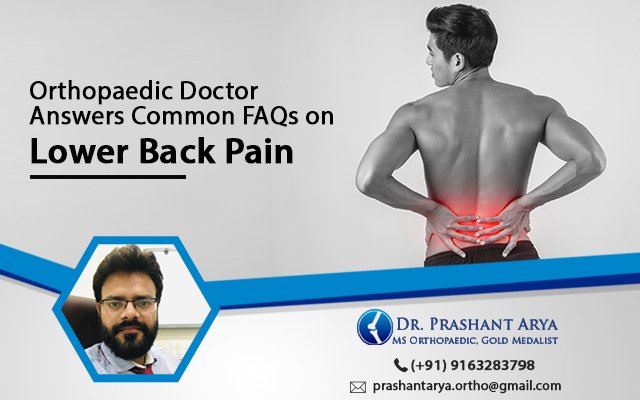When patients are examined by Dr. Prashant Arya, the most common problem they will mention is low back discomfort. Patients are understandably anxious about their diagnosis, treatment options, and prognosis because it can be a severely crippling disorder. Here are the five most common low back pain inquiries that patients will ask the famous orthopaedic doctor in North Kolkata in the appointment.
- What are the most common causes of pain and discomfort in the lower back?
Ans. Nearly 80% of adults suffer from low back discomfort. Myofascial pain, or muscle tightness or soreness, is the most prevalent anatomical cause of low back pain in most individuals. The discs, facet joints, and nerves are the next most common causes of low back pain and discomfort.
- What can I do at home to relieve my back pain?
Ans. A brief course of anti-inflammatory drugs, stretching, and a mix of ice and heat will usually relieve muscular low back discomfort. Low back pain can be relieved with stretches like knee-chest, piriformis stretch, and pelvic tilts. Back pain caused by muscle generally lasts one to two weeks. Consult your orthopaedic specialist doctor in Newtown, if you have persistent low back discomfort with pain or numbness extending down your leg.
- Aside from spine surgery, what other treatment options are available?
Ans. The good news is that most people with low back pain will find relief from medicines and regular physical therapy. Anti-inflammatory drugs, muscle relaxants, and steroids are some of the medications used. The use of narcotics to treat low back pain is uncommon.
Interventional pain management, which includes epidurals, facet ablations, and trigger point injections, is another therapy option. Acupuncture, massage, yoga, and chiropractic manipulation are among non-operative treatment alternatives that might be considered. Due to a lack of high-quality evidence confirming their usefulness, experimental treatments such as platelet-rich plasma and stem cell injections are not currently indicated.
- What are the symptoms that my low back pain necessitates a visit to an orthopaedic surgeon?
Ans. Certain symptoms necessitate an immediate appointment with an orthopaedic surgeon in North Kolkata. Progressive weakness in the lower extremities, as well as bowel or bladder problems, are examples. Fortunately, these symptoms are extremely uncommon. Patients are more likely to complain of chronic severe pain that is resistant to conservative treatments such as physical therapy, medicines, and injections.
- What improvements have been made in the field of spine surgery?
Ans. The goals of spine surgery have remained consistent: decompress the nerve and, if required, stabilise the spine. There have been numerous advancements in spine surgery that have made it safer and more successful. Minimally invasive spine surgery allows us to treat the pathology effectively with fewer incisions, resulting in a speedier recovery. Intraoperative navigation allows orthopaedic surgeons to use instruments with the greatest precision possible.







Leave A Comment